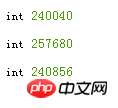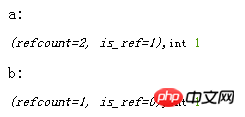
This article mainly introduces the specific steps and related operating techniques of PHP garbage collection and memory management mechanism. Friends in need can refer to it. I hope it can help everyone.
Memory management mechanism
<span style='font-family: 微软雅黑, "Microsoft YaHei";'>1 var_dump(memory_get_usage()); //获取内存<br>2 $a = "laruence"; //定义一个变量<br>3 var_dump(memory_get_usage()); //定义变量之后获取内存<br>4 unset($a); //删除该变量<br>5 var_dump(memory_get_usage()); //删除变量后获取内存<br></span>
It can be seen from the above that the memory management mechanism of PHP is: give a space in advance to store variables, and when the space is not enough, apply for a new space.
1. Store variable names and have symbol tables.
2. Variable values are stored in memory space.
3. When deleting a variable, the space where the variable value is stored will be released, but the symbol table where the variable name is located will not be reduced.
<span style='font-family: 微软雅黑, "Microsoft YaHei";'>var_dump(memory_get_usage()); //获取内存<br>//定义100个变量for($i=0;$i<100;$i++)<br>{ $a = "test".$i;<br> $$a = "hello";<br>}//获取定义100个变量之后的内存var_dump(memory_get_usage());//定义100个变量并删除for($i=0;$i<100;$i++)<br>{ $a = "test".$i; unset($$a);<br>}//获取删除之后的内存var_dump(memory_get_usage());</span>
As can be seen from the above, although the memory has become smaller after deletion, it is still larger than before the variable was defined. This is because although The value of the variable is deleted, but the variable name is not deleted.
php garbage collection mechanism
PHP variable storage is stored in a zval container
1. Type 2. Value 3. is_ref represents whether there is an address reference 4. refcount is the number of variables pointing to the value
1. When assigning values to variables: is_ref is false and refcount is 1
<span style='font-family: 微软雅黑, "Microsoft YaHei";'>$a = 1;<br>xdebug_debug_zval('a');echo PHP_EOL;</span>
2. Assign the value of variable a to variable b. Variable b will not store the value in memory immediately, but first points to the variable The value of a, until there is any operation on variable a
<span style='font-family: 微软雅黑, "Microsoft YaHei";'>$b = $a;<br>xdebug_debug_zval('a');echo PHP_EOL;</span>
3. Because the program operates variable a again, variable b will itself Apply for a piece of memory and put the value in it. Therefore, the refcount in the zavl container of variable a will decrease by 1 and become 1. The variable c points to a, so the refcount will increase by 1 and become 2
<span style='font-family: 微软雅黑, "Microsoft YaHei";'>$c = &$a;<br>xdebug_debug_zval('a');echo PHP_EOL;<br>xdebug_debug_zval('b');echo PHP_EOL;<br></span>
Garbage collection mechanism
1. In version 5.2 or earlier, PHP will determine whether it is garbage based on the refcount value
If the refcount value is 0, PHP will release it as garbage
This recycling mechanism is defective, and variables with circular references cannot be recycled
2. The garbage collection mechanism has been improved in versions after 5.3
If the refcount in a zval container is found to be increasing, it means it is not garbage
If it is found that the refcount in a zval container is decreasing, if it is reduced to 0, it will be directly treated as garbage collection
If it is found that the refcount in a zval container is decreasing, and If it is not reduced to 0, PHP will put the value in the buffer as a suspect object that may be garbage.
When the buffer reaches the critical value, PHP will automatically call a method to traverse each value, and clean it if it is found to be garbage
The above is the detailed content of Detailed explanation of PHP garbage collection and memory management mechanism. For more information, please follow other related articles on the PHP Chinese website!




